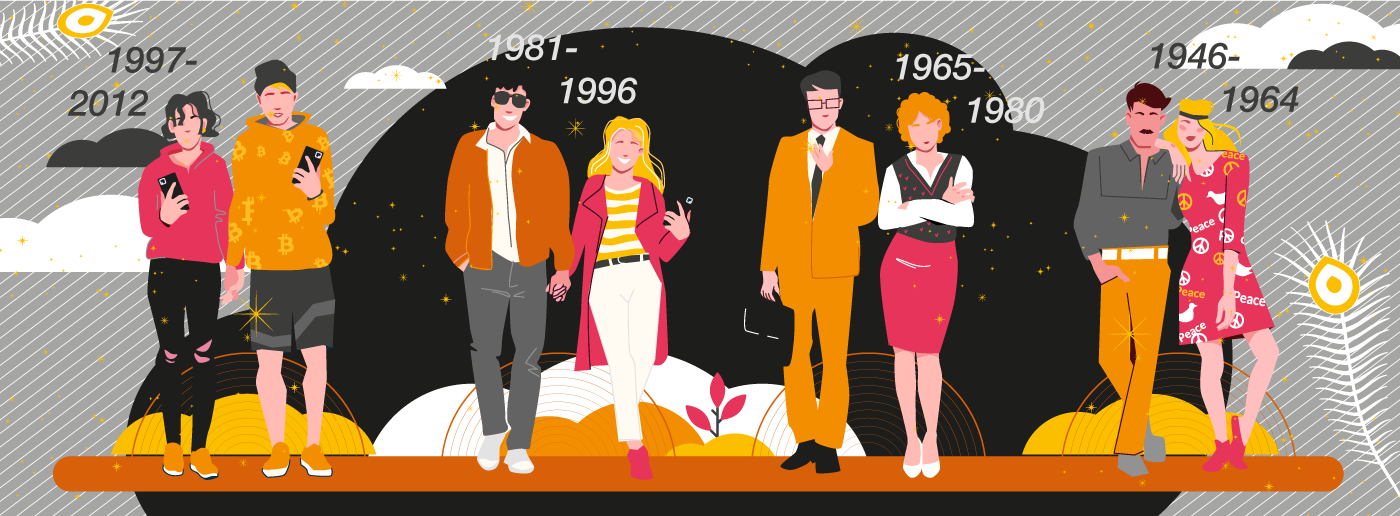In the ever-changing tapestry of our society, each generation contributes unique threads that weave together the fabric of our cultural identity and define who we are. As the world progresses, generational gaps become more apparent, often accompanied by a plethora of clichés and stereotypes that attempt to define each cohort.
Well, we can simply look no further than Gen Z, also called “Zoomers”, a group that, unlike their predecessors, has been catapulted into a world immersed in technology from an early age—in the same way as Obelix has fallen in the cauldron of magic potion when he was a child— giving rise to stereotypes that portray them as digital natives.
Zoomers also have their own language, coining words such as “rizz” which has been named word of the year 2023 by Oxford University Press and is basically internet slang for romantic appeal or charm.
From the Baby Boomers’ alleged aversion to technology to the Millennials’ tech-savvy nature, these stereotypes can shape perceptions and influence societal expectations.
The making of our very own generational survey
Speaking of expectations, we asked eight people from our Firm—four men and four women—from different lines of services and different grades, some open questions as well as multiple-choice questions.
We wanted to know what the four different generations they represent—Boomers (1946-1964), Gen X (1965-1980), Millennials or Gen Y (1981-1996) and Gen Z (1997-2012)—are looking forward to in 2024, and the years to come, as well as what their hopes (and concerns) are in general for their private and professional life.
We couldn’t think of a better place to perform it than here at PwC Luxembourg. We now have over 3,700 people employed coming from 94 different countries. They represent multiple cultures and different generations. Thus, if we may be so bold, there is no denying that our Firm embodies a microcosm of our society.
In this blog, we share and analyse the results of our short survey.
We asked, they answered: Our People’s aspirations and expectations per generation
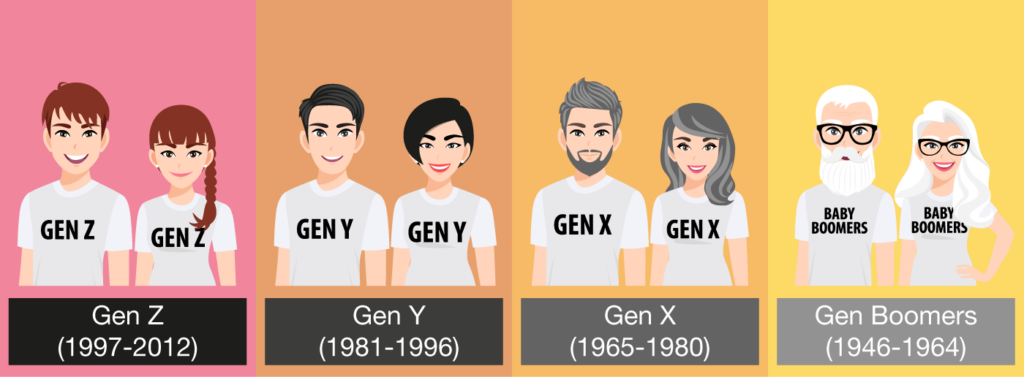
Question 1: What is the most important factor when assessing your work environment?
Click here to expand or collapse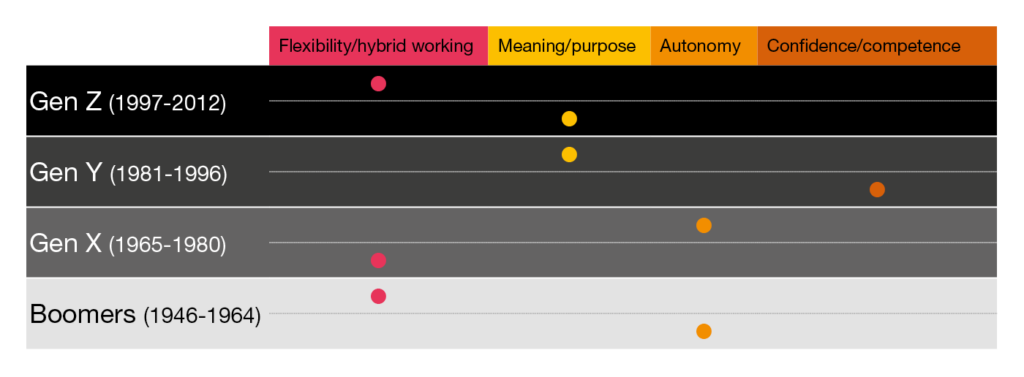
Question 2: What would be your ideal work week?
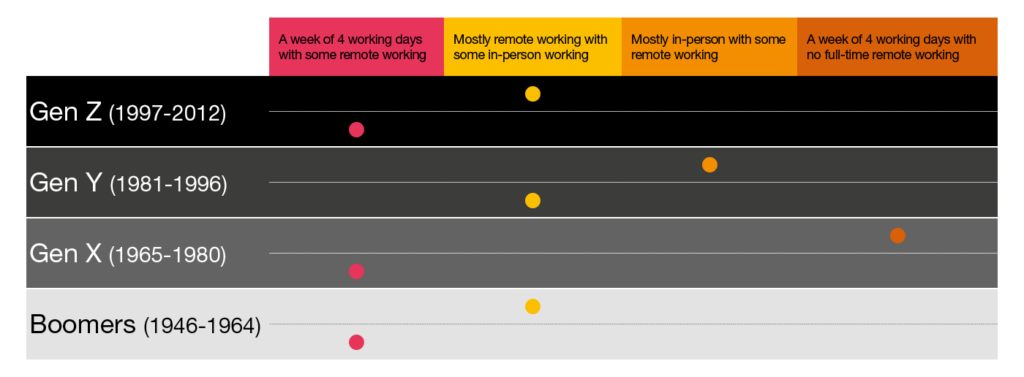
Question 3: Working in a multigenerational team is/would be for you:
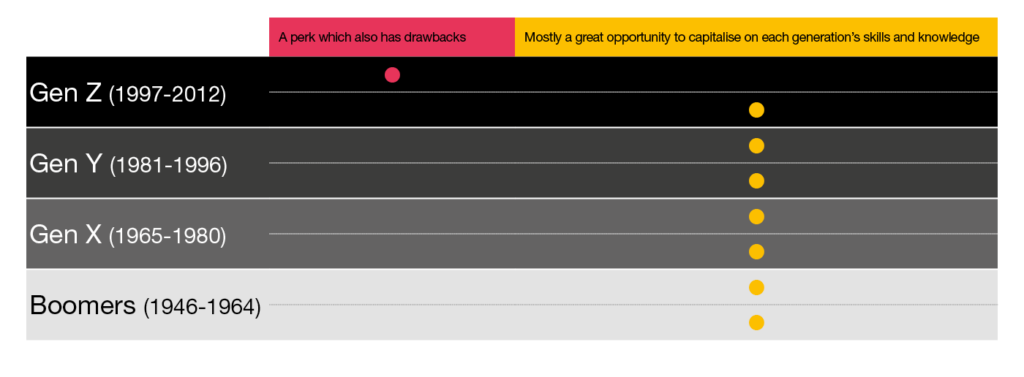
Question 4: How comfortable would you feel working with someone from a different generation?
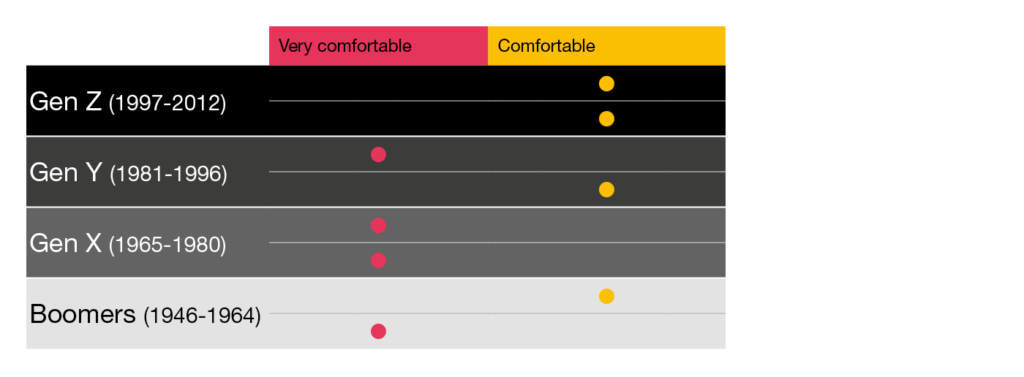
Question 5: What do you believe are your best work traits?
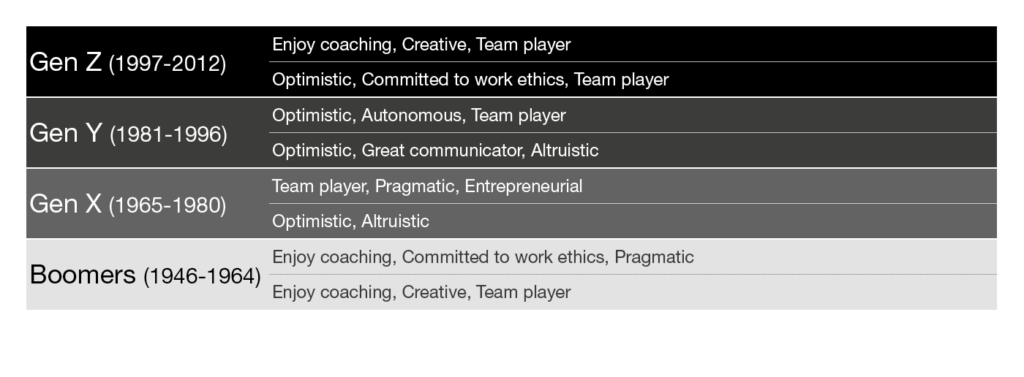
Question 6: What do you want from work?
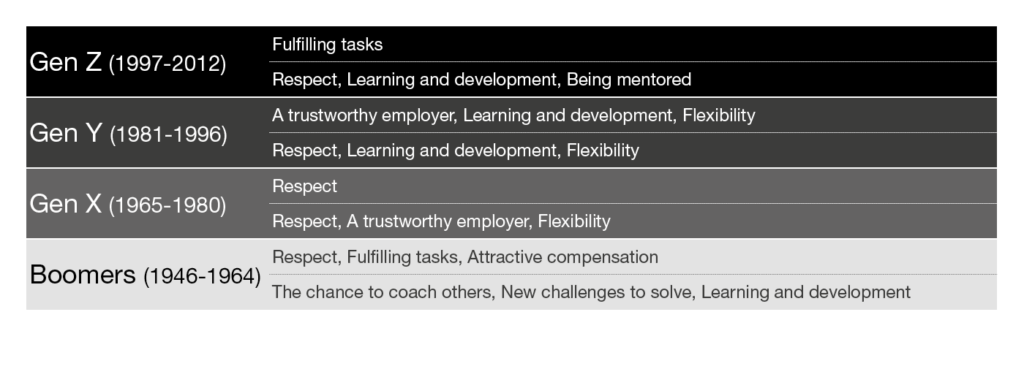
Question 7: Which new experience do you want to try in 2024?
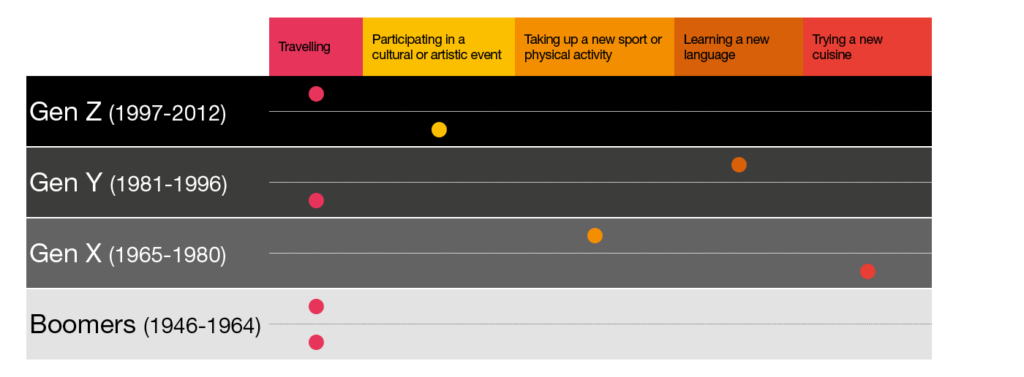
Question 8: In 2024, what positive habits do you want to cultivate?
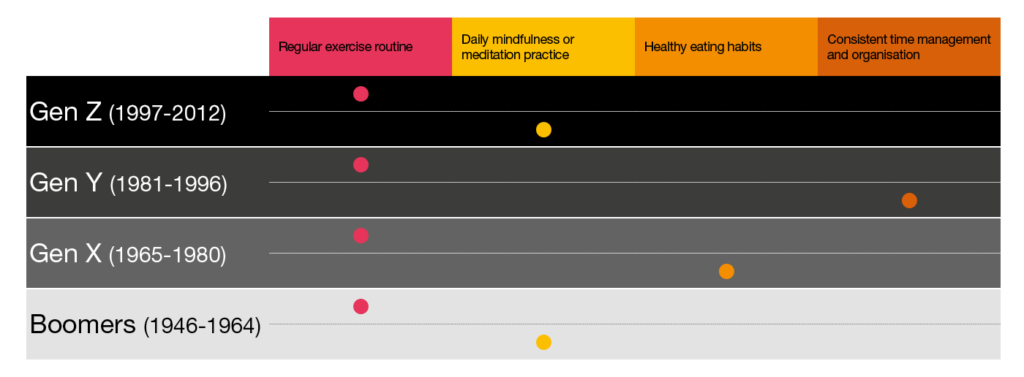
Question 9: Which hobby or passion project do you plan to dedicate more time to in 2024?
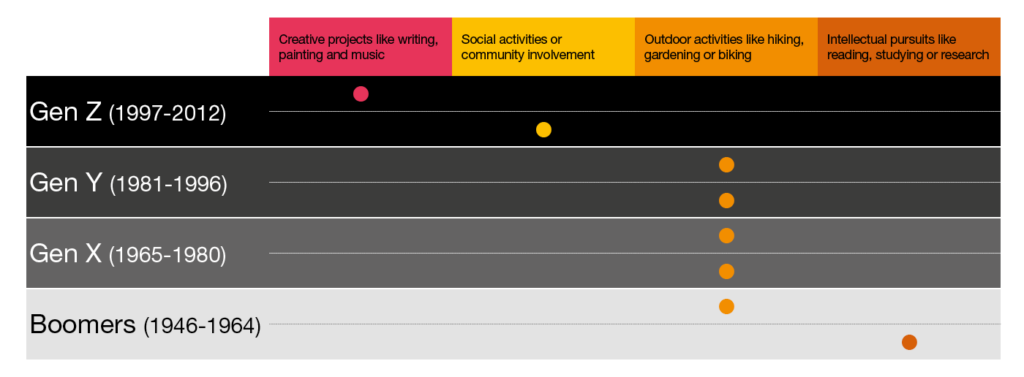
Question 10: Which aspect of personal development is a priority for you in 2024?
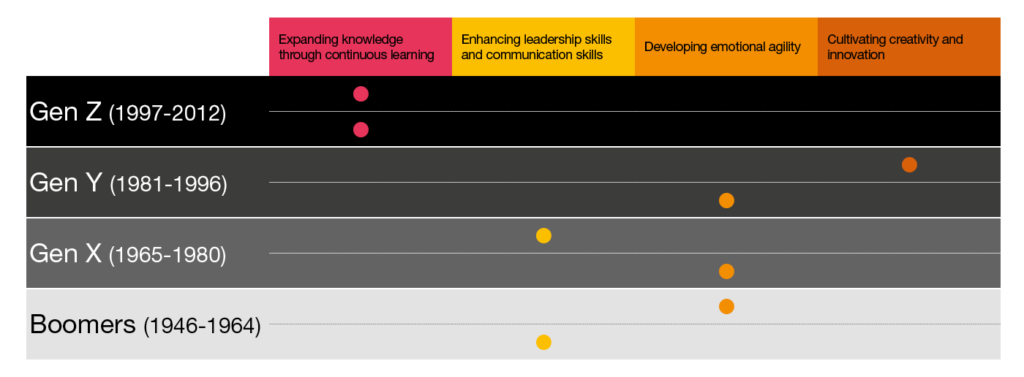
Question 11: Where would you like to travel in 2024?
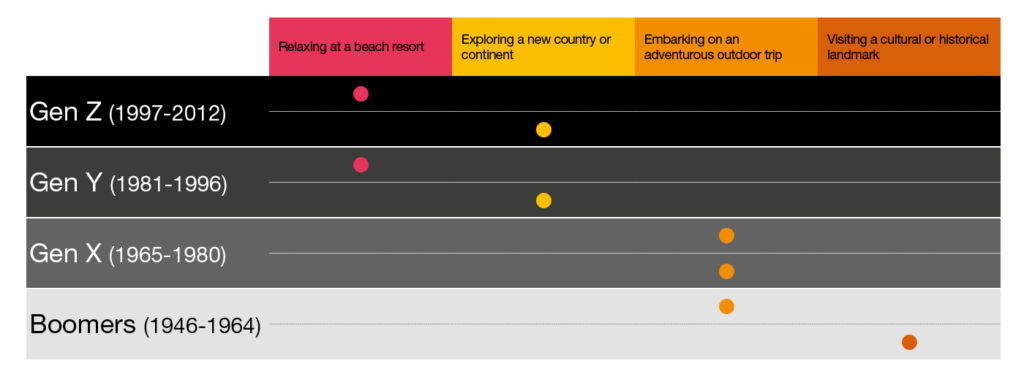
Question 12: If you could promote a cause, which one would it be?
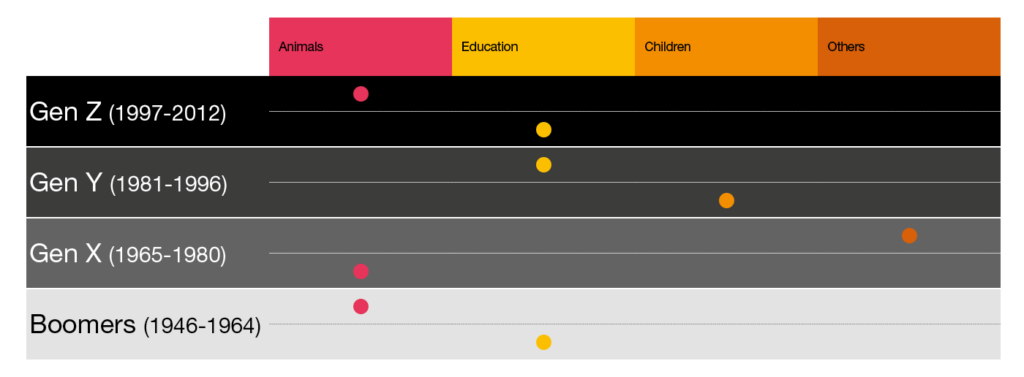
Reading between the lines of the results
Let’s deep dive now into the results to see if there are any discrepancies or common points between the different generations. We aren’t going to lie—this exercise wasn’t as straightforward as we thought it would be.
In fact, considering the stereotypes we mentioned at the beginning of our blog entry, we were naturally expecting some significant contrast between the answers of, for instance, Gen Z and Boomers. However, surprisingly enough, we didn’t identify major shifts from one generation to another. Undoubtedly, this was an opportunity to confront our own biassed views.
Starting with the feedback received on the expectations of our respondents on their professional life, we notice that all generations mention AI as a new skill to improve or a new tool to use in the coming years, mostly as a way to increase efficiency.
While this may not come as a surprise for Gen Z respondents given their innate affinity with innovation and technology, it’s interesting to note that other generations demonstrate the same eagerness to embrace AI. Yet, one Gen Y identified as being “old school” and showed some reluctance towards new technologies.
When it comes to ways to contribute to a positive work environment, there is as well common ground across generations. For them, the human factor—fostering good human relationships— plays a key role in a healthy work environment. That includes simple gestures such as saying hello and smiling to colleagues. In the same way, respect is a recurring value for Boomers, Gen X and Gen Y.
There was also consensus in terms of work-life balance strategies we, as a firm, should consider implementing. Recognising the satellite offices as our biggest step to facilitate the balance between work and private life by saving commuting time, there is a common wish to reinforce this approach and to extend it even further.
In the same view, when asked about the most important factor when assessing their work environment, it turns out that flexibility and hybrid work was a common factor for a Gen Z, a Gen X and a Boomer. While a Gen X and a Boomer mentioned autonomy, a Gen Z and a Gen Y highlighted meaning/purpose. These results reflect how the COVID-19 pandemic has led to a profound shift in the ways we work.
That leads us to our question about what the ideal work week looks like for them. In the current post-COVID era, we would expect boomers to be more keen to return to the office, while the younger generations would prefer to stay remote or hybrid.
However, the results show that Gen Z, Gen Y and Boomers mostly prefer remote working with some in-person working. Moreover, we also noticed a strong appetite for a four-day working week with some remote working for Gen Z, Gen X and Boomers.
In a nutshell, flexibility and remote working have become universal desires across all generations and companies want to take them into account to increase their employee retention.
We were also delighted to observe that Gen Y, Gen X and Boomers consider that being part of a multigenerational team is mostly a great opportunity that allows them to capitalise on each generation’s skills and knowledge. On the other hand, Gen Z respondents had a mixed opinion, recognising that a multigenerational team is a perk that also has some drawbacks. Still, all generations either feel comfortable or very comfortable working with someone from a different generation.
There is no denying that each generation has its own expertise and, as such, people from different generations can learn from each other—and this is a clear advantage for our firm. Interestingly, what could at first be perceived as an asset of a specific generation, can in fact benefit everyone.
In terms of work traits, some characteristics that are also common to several generations are “team player” or “enjoy coaching”, which was interestingly enough mentioned by Boomers and Gen X, who have more experience to pass on their knowledge, but also underlined by a Gen Z.
Looking at our People’s expectations in their private life, when about their wishes for 2024, we find the human factor again at the core, with common answers around “peace and love”, “tolerance”, “solidarity” and again the above-mentioned value of “respect”. In this shared journey, empathy becomes the bridge that spans the generation gap, connecting hearts and minds across the varied landscapes of age and experience.
Regarding their personal development, which is a priority for our respondents in 2024, Gen Z stressed the importance of “expanding knowledge through continuous learning”, while the other generations are more focused on “enhancing leadership skills and communication skills”, “cultivating creativity and innovation” and “developing emotional agility”.
Conclusion
Firstly, we want to thank Laurine, Thomas, Pierre-Jean, Vanessa, Andrew, Jeanine, Marie-Ange and Siemon for accepting and taking the time to answer our questions. They represent our firm’s different generations and are the living example of the multigenerational unity that prevails despite the underlying differences inherent to each generation and each individual.
As we navigate the ever-evolving currents of time, the symbiosis between the different generations emerges as a source of strength—a testament to the richness that diversity adds to the human story.
It’s a celebration of the past, present, and future interwoven. It’s within this intergenerational collaboration that resilience finds its roots, innovation blossoms, and the continuum of progress is sustained for a bright future.
On this celebratory note, we wish you, dear readers, a happy holiday season and a fantastic 2024!
What we think

“Embracing the unique traits and skills each generation brings to the table is fundamental for any organisation as it cultivates an environment where innovation flourishes and adaptability prevails. It’s the pathway to a vibrant and resilient organisational culture that can navigate the challenges and opportunities of the future.”
Roxane Haas, Partner and People Leader at PwC Luxembourg
“I strongly believe that inclusion policies must acknowledge and address cross-generational challenges, recognizing the unique perspectives each generation offers. By promoting an environment that values age diversity, our organisation can harness a wealth of experiences and skills, creating a unique mix of perspectives that is more creative and taking the best of each of us, and this is exactly what we at PwC Luxembourg consider our richness.”
Marc Schernberg de Plata Acevedo, Partner and Diversity, Equity and Inclusion Leader at PwC Luxembourg


